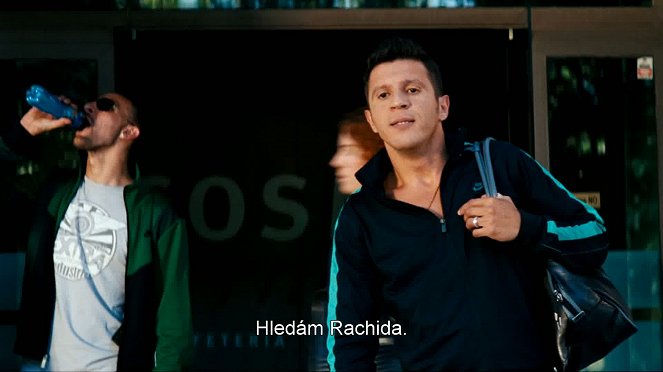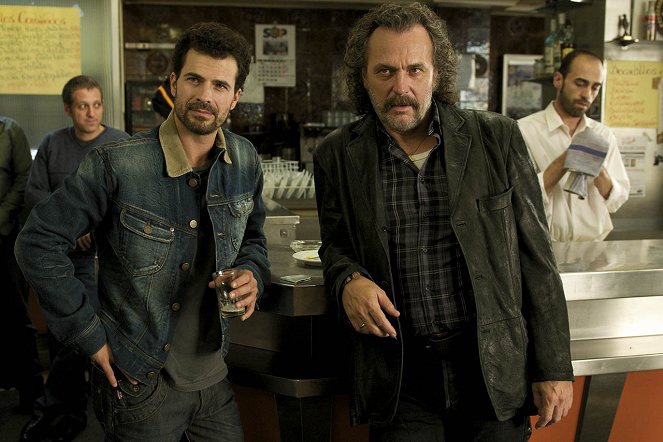Rendező:
Enrique UrbizuOperatőr:
Unax MendíaZeneszerző:
Mario de BenitoSzereplők:
José Coronado, Rodolfo Sancho, Carlos Olalla, Helena Miquel, Nadia Casado, Juan Pablo Shuk, Miguel Guardiola, Pedro Mari Sánchez, Cristhian Esquivel (több)Tartalmak(1)
Following the trail of a missing girl, police inspector Santos Trinidad (Jose Coronado) gets involved in a shooting. The result: three dead bodies and a witness who manages to escape. Santos will get into hot water explaining the mess if he does not find the witness. The hunt begins. Judge Chacon (Helena Miquel) will be in charge of investigating the events occurred the night of the dreadful shooting. As they investigate the case, Santos and Chacon will discover that behind an apparently normal war between drug dealers and common criminals lies a plot more complex and dangerous than they could ever have imagined. (Warner Bros. España)
(több)Videók (2)
Recenziók (3)
Santos Trinidad is a tough guy who today's feminists would declare to be completely permeated with toxic masculinity. Among his police superiors, there is a mix of respect for his experience and stubbornness and concerns about his unrestrained behavior. His past is not something to be pried into, as his mission in Latin America ended in a bloody scandal, and people still dance around him on tiptoes. When a man, with whom he has unfinished business, crosses his path one late evening saturated with alcohol, things start to happen. Trinidad is a character who embodies the hard men from American and French crime films of the 70s. Even though effective, police methods have little in common with the age of the internet and artificial intelligence. The thriller is strongly influenced by the noir genre, which I have a weakness for. Additionally, I appreciate that the director and screenwriter do not give the viewer anything for free and they force them to think about actions, characters, and motivations, and keep them in constant suspense by gradually revealing information. On the other hand, there is nothing incomprehensible, let alone mysterious, in the story. The film gives a clear answer to the observant viewer about who Santos Trinidad is and whether it's worth having such an existence (not only) in the police force. The film goes against established genre conventions in certain aspects, and therefore against the expectations of (mainly popcorn-eating) viewers, which is a clear plus for me. I thoroughly enjoyed this journey towards fulfilling my own definition of justice. Overall impression: 90%.
()
I came back to this movie after ten years because of how much the personality and the look of the protagonist remind me of the main character in the computer game Disco Elysium. And I'm really quite surprised that there's no mention of the connection between these characters. Either that vision of the broken detective is so visually homogeneous in European culture that the film and game know nothing of each other, or the writers of Disco Elysium didn't acknowledge the inspiration. But if we push that element aside, we're still left with a very unique crime drama with a morally quite problematic script. SPOILER ALERT: Here, while trying to cover his tracks after drunkenly shooting three people in a bar, protagonist Santos unwittingly uncovers a much larger plan, the successful execution of which would result in the deaths of hundreds of innocent people. This is done, among other things, by completely resigning himself to technology and disconnecting himself from the bureaucratic police system that is thus unable to stop him or deflect him from his axis. By contrast, the inspector who, through the people Santos shot, is on the trail of the same case, is unable to solve it within a police system that constantly blocks her path, knowingly and unknowingly. In the manner of the old crime stories, we are thus told that in the chaotic world of organized crime, it is not possible to succeed by conforming to its system, but that you need, from time to time, an unguided missile that is able to pierce to the core and rip out the heart, often at the cost of your own life. Except that Santos is not a controversial bon vivant in the mold of Belmondo, but a cynic, a wreck, and a murderer who doesn't claim any sympathy from the viewer with any scene. Whether or not this film is a vindication of his approach I don't know entirely, but it is certainly an excellent defense of one film genre.
()
This noir-tinged Spanish crime thriller starts where many films of the same ilk finish, with a cold-blooded triple murder. The narrator of typical noir would spend the rest of the film explaining the causes of the crime through flashbacks. Santos Trinidad, however, does not go back to the past and doesn’t try to convince us that what he did was right. The protagonist with the appearance of a vagrant and disdain for modern technology (he uses a revolver instead of an automatic, mobile telephones annoy him, recording devices are a threat to him) wants only to escape justice. His main goal is not to remedy the corrupt world in which the inspector does not search for the killer, but for the one that he himself killed. Rather, his goal is merely to survive in that world. With the initial loss of credibility on the part of the police, he finds himself at the point of no return. He knows that he can no longer rise in the ranks and that he can only sink lower. The noirish fatalism is intensified by the slow uncovering of the global contexts of criminal activities, which Santos unluckily became aware of at the beginning. The scope of the conspiracy enables the filmmakers to continuously reveal (or conceal) new information, whose evaluation occupies us to the point that we find ourselves digging around in the past of the protagonist, who acts methodically without any emotion. A stark narrative form was chosen in line with the protagonist’s Melville-esque straightforwardness. Where the placement of the characters allows it, refocusing is used instead of cuts (this stylistic technique effectively captures the fact that the characters are constantly watching someone and thus logically must be in the same field of vision as the subject that they are observing). The stable, concentrated camerawork does not show us more than we need to see (thanks to which the only significant deviation from horizontal filming just before the end particularly stands out). The mood of the setting – whether a nightclub, a distant landfill or a shopping centre – is captured in concise shots, which have the added benefit of enriching the narrative. The camera doesn’t linger on the landscape to flesh-out the atmosphere. Non-diegetic music is also used sparingly, only a few times to build the tension. We could want more cohesiveness from the narrative, but I am convinced that the non-fulfilment of viewers’ expectations, when the films starts out in a particular direction and then unexpectedly deviates from it, was intentional (see, for example, the judge’s questioning, which decelerates the narrative). What I most appreciate about the captivatingly aloof No Rest for the Wicked is its bold faith in the patience of the viewer, for whom the well-thought-out distribution of information will be an adequate substitute for an emotional connection with the characters. 75%
()



Hirdetés